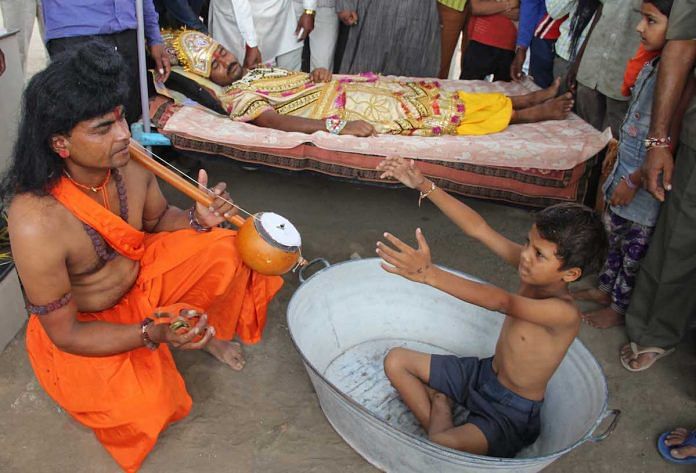- The Bill proposes to ban 13 ritual practices that are physically harmful or injure dignity, and is the latest effort to rid society of superstitions.
The Karnataka Prevention and Eradication of Inhuman Evil Practices and Black Magic Bill (KPE Bill), 2017, was tabled on Tuesday at the ongoing legislative session in Belgaum. Proposing to ban 13 ritual practices that are physically harmful or injure the dignity of individuals and communities, this Bill is in the long line of efforts, seen since Raja Ram Mohun Roy’s efforts to have Sati banned in the 19th century, to rid society of religious superstitions.
Early social reformers had faced opposition from the religious orthodoxy. As Ishwar Chandra Vidyasagar lay dying, the opponents of his campaign to allow widows to remarry celebrated outside his home. A dozen decades later, the state BJP accuses the KPE Bill of being “anti-Hindu”. But in the era of votes and elections, the stakes are different.
The KPE Bill purports to preempt hurtful practices found across religions, not merely Hinduism. Temple priests, sufi healers, evangelical miracle men: all are culpable, if their prescribed methods result in bodily injury or death.
Following Maharashtra’s lead
Following the rationalist Dr Narendra Dabholkar’s murder in 2013, the Maharashtra government promulgated the Maharashtra Prevention and Eradication of Human Sacrifice and other Inhuman, Evil and Aghori Practices and Black Magic Bill 2013 as an ordinance.
Under this ordinance, the financial and physical exploitation of individuals using black magic and superstitions became a cognizable offence. The text of this Bill had, in fact, been drafted by Dabholkar and his colleagues in the Blind Faith Eradication Committee two decades earlier, in 1990, but local opposition, especially from the Warkari Sect, ensured it went nowhere (Similar legislative measures to prevent “witchcraft” killings have been around from before in Bihar and Odisha).
The Congress-led state government of Karnataka soon chose to follow Maharashtra. In late 2013, it asked the Department of Social Welfare and the National Law School of India, Bengaluru, to prepare separate drafts of a bill titled, Karnataka Prevention of Superstitious Practices.
From human sacrifice to the violent exorcism of spirits, from using black magic to bring harm to a “third party” to the spatial isolation of pregnant women, this Bill made 13 categories of activities culpable of criminal offence. Many of them deprived individuals, it argued, of the right to dignity guaranteed under the Constitutional Right to Equality. Astrology shows on television, it noted further, violated the Cable Television Networks Rules, 1994, which forbid the telecast of any programme that “encourages superstition or blind belief”. Existing laws, in other words, offered sustenance to the Bill’s proposals.
Two ritual practices disallowed by the Bill, in particular, had been widely discussed in recent times. Made Snana, where devotees – from across castes, in fact – roll over the food left over by Brahmin devotees in certain temples, including the famous one in Kukke Subramanya, believing that that would cure them of skin ailments, was one. Panktibeda, where devotees are served food separately along caste lines in a few temples and mathas, was another. These practices of caste hierarchies, the Bill affirms, should cease.
The draft Bill met with intense opposition, especially from the BJP, VHP, Bajrang Dal, and heads of a few religious bodies. It curbed, they held, Hindu religious practices in the name of superstition. A few mainstream newspaper and TV channels carried out a disinformation campaign: the Bill does not allow Hindu women to wear kumkuma or mangalsutra; it asks that idols and photos of gods be removed from houses; and such like.
There was genuine confusion as well. Not telecasting astrology shows was fine, but could individuals visit palmists in their private capacity?
As a result, the government deferred tabling the Bill. The murder of Dr M.M. Kalburgi in 2015 brought new pressure, but the law minister chose to wait until a revised draft was readied.
Astrology, vaastu, the piercing of children’s noses and ears, and the Jain practice of manually plucking out one’s hair (kesh lochan) have been kept out of the purview of the just-tabled Bill.
In anticipation of the backlash, the Bill takes pains to list out the things it doesn’t forbid: “prayers, upasana and all religious rituals at home, temple, dargah, church, gurudwara, pagoda and other religious places which do not cause physical injury”, “all religious celebrations, festivals, prayers, procession…”, religious discourses, the singing of bhajans and storytelling in public, among others.
Reform efforts
This legislative episode from Karnataka is of course part of an older, larger story of the efforts of modern Indians to reform the “irrational” religious practices. In this encounter, the irrationalities of modern society do not come up for trial. For instance, the boundless faith people have in technology’s ability to manage climate change. Whether the believers believe in religion the way the secular activists think they do is another matter altogether.
An alternate tradition of thought – Gandhi is the most spectacular figure here – has asked that religious traditions reform themselves from within, as it were, and not be engineered by external sources like modern law. In this view, tradition will have internal resources to rid itself of unacceptable practices. Those grounded in religion or tradition are best able to fashion this self-criticism, and their efforts are likely to appeal more to the believers and result in more durable reform, rather than punitive legal measures.
While concurring with this view, a few of the supporters of the Bill remain unsure whether powerful religious institutions will let internal criticisms of tradition have an effect on them. It is the poor and the illiterate lacking access to good health care, they insist, who are the most vulnerable to superstitions and that law can go a long way in protecting them.
The old Indian debate continues.
The author is a Professor of Sociology at the Azim Premji University in Bengaluru
Also read:Opposed by BJP many times, anti-black magic bill tabled in Karnataka assembly



